May 6–8, 2021 • Notre Dame's London Global Gateway
Is the foreigner friend or foe? The rhetoric around immigration has become ever more heated as globalization, climate change, pandemics, civil wars and proxy wars, the ease of travel, and cross-cultural exchange and encounter have rapidly increased. In the transition from the medieval to the early modern period, a similar intensity in such activity within Europe and outside its borders dominated everything from literature to politics to religion.
A nascent xenophobia makes itself known in disputes between different peoples, of course, but also between members of the same culture. In France, for example, Protestants were often considered a foreign element to be excised. On the other hand, foreigners often fascinated the natives or served as a political tool of comparison in their attempts to affirm or purify their own culture. Either way, representations of and interactions with the foreigner could reveal ambiguity with respect to the newcomer but also within one’s own culture. The stranger could quickly become one’s neighbor, if the conditions were right. This complicates medieval and early modern xenophobia, as fears can be assuaged if certain advantages present themselves.
This interdisciplinary conference, with a special focus on the domains of literature, religion, theology, politics, and history and their intersections, seeks to explore the reality of xenophobia and what role it played in medieval and early modern societies. Do outsiders offer an opportunity for charity or even enlightenment? Are they insidious agents of a foreign power or reinforcements called in to strengthen a purportedly supranational religious identity? Are they rapacious barbarians or civilized partners of trade? This is more than a question of the “Other”; it is about exploring the ambiguities of migration and cross-cultural exchange in the culture and in daily life in a period of religious, political, and cultural upheaval within Europe and beyond.
Paper topics will be especially welcome in the following areas:
Immigration inside and outside Europe
Protestant and Catholic migrations
The virtue of charity
Religion and poverty
Duty and practice of hospitality
Literary representations of the foreigner
Travel narratives
Rhetoric, polemic, and satire
Medieval and early modern theology
Historiography of the stranger
International politics and diplomacy
Spread of disease and treating the sick
Keynote Speakers:
George Hoffmann is a professor of French at the University of Michigan, where he specializes in the literature, history, and culture of sixteenth-century France, with a special focus, among others, on religious studies and the history of the Reformation. He received his M.Phil. from the Université d’Aix Marseille before completing his Ph.D. from the University of Virginia in 1990. Reforming French Culture (2017), his most recent book, argues that religious satire not only fostered the crucial reformed experience of spiritual alienation but that this experience informed the trajectory of French culture more broadly, descending to today’s republican universalism and laïcité.
Anthony Pagden is distinguished professor of political science at UCLA. His research has concentrated on the relationship, cultural, political and legal, between the peoples of Europe and its overseas settlements and those of the non-European world from the Atlantic to the Pacific. His main concern is in the political theory of empire, in how the West sought to explain to itself how and why it had come to dominate so much of the world, and in the present consequences of the erosion of that domination. He has also written widely about cosmopolitanism, nationalism, internationalism and about the history and the future of the European Union. He is the author of more than a dozen books, many of which have been translated into a number of European and Asian languages. His most recent publications include The Enlightenment – and why it still matters (Random House and Oxford University Press) in 2013, and in 2015, The Burdens of Empire: 1539 to the Present (Cambridge University Press).
All lodging expenses for paper presenters will be reimbursed. Some meals provided. Please send an abstract no longer than 200 words and an abbreviated CV to strangers@nd.edu before July 1, 2020. Decisions will be released on or before September 15, 2020. Proposals by advanced graduate students will be considered.
http://sites.nd.edu/strangers-and-neighbors-conference/

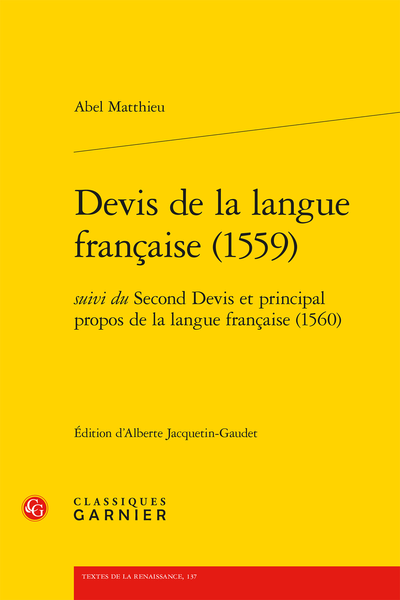 Abel Matthieu, Devis de la langue française (1559), suivi du Second Devis et principal propos de la langue française (1560), éd. Alberte Jacquetin-Gaudet, Paris, Classiques Garnier, (2008) 2023.
Abel Matthieu, Devis de la langue française (1559), suivi du Second Devis et principal propos de la langue française (1560), éd. Alberte Jacquetin-Gaudet, Paris, Classiques Garnier, (2008) 2023.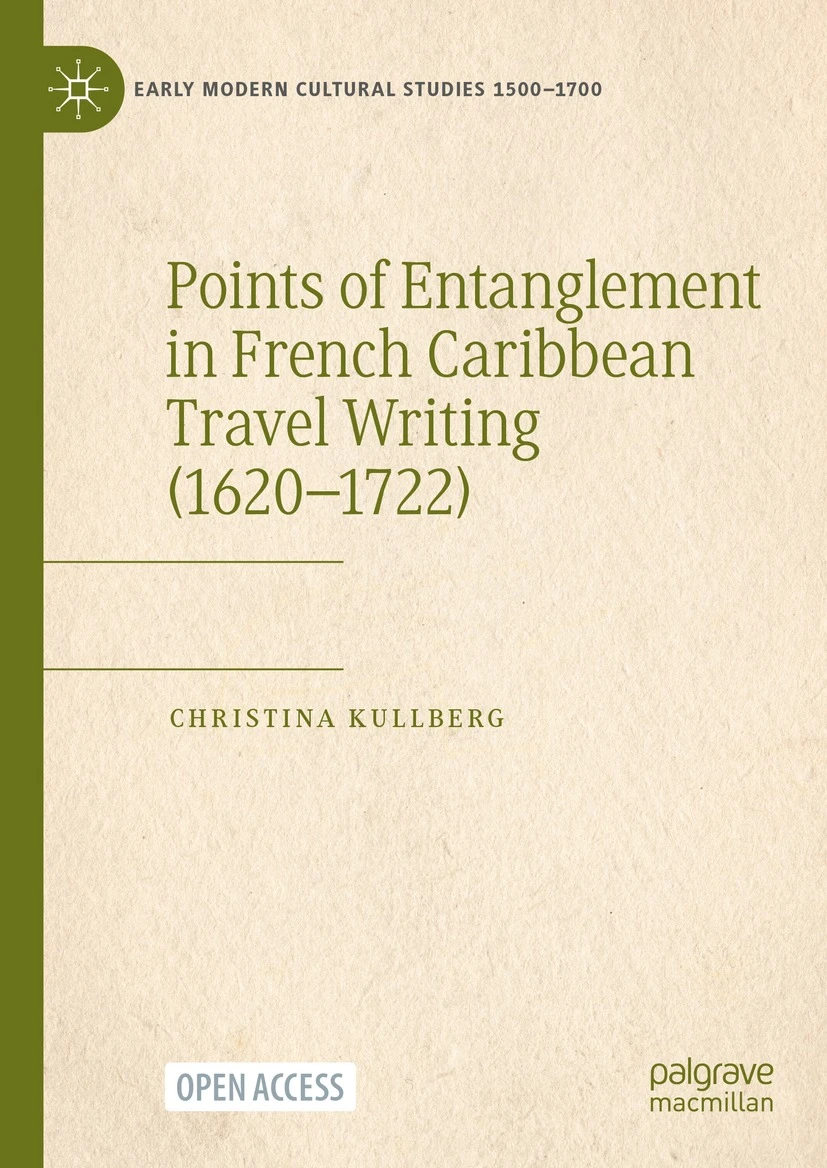 Christina Kullberg. (2023). Points of Entanglement in French Caribbean Travel Writing (1620-1722). Palgrave Macmillan.
Christina Kullberg. (2023). Points of Entanglement in French Caribbean Travel Writing (1620-1722). Palgrave Macmillan.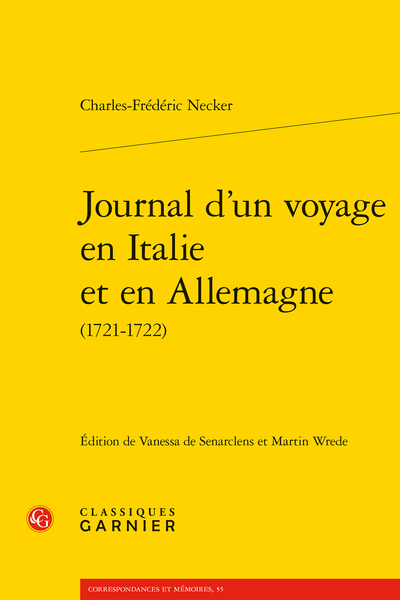 Charles-Frederic Necker, Journal d’un voyage en Italie et en Allemagne (1721-1722), éd. Senarclens (Vanessa), Wrede (Martin), Parid, Classiques Garnier, 2023.
Charles-Frederic Necker, Journal d’un voyage en Italie et en Allemagne (1721-1722), éd. Senarclens (Vanessa), Wrede (Martin), Parid, Classiques Garnier, 2023.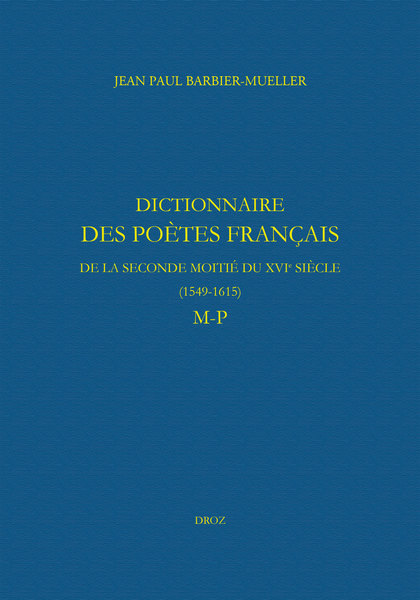 Dictionnaire des poètes français de la seconde moitié du XVIe siècle (1549-1615). Tome V : M-P, dir. Jean Paul BARBIER-MUELLER, Genève, Droz, 2023.
Dictionnaire des poètes français de la seconde moitié du XVIe siècle (1549-1615). Tome V : M-P, dir. Jean Paul BARBIER-MUELLER, Genève, Droz, 2023.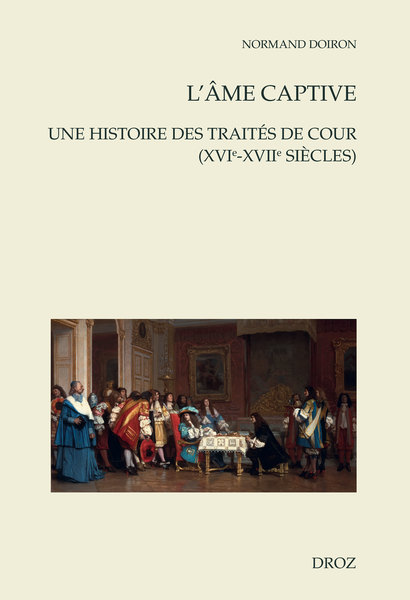 Normand Doiron, L'âme captive. Une histoire des traités de cour (XVIe-XVIIe siècles), préface de Bernard Beugnot, Genève, Droz, 2023.
Normand Doiron, L'âme captive. Une histoire des traités de cour (XVIe-XVIIe siècles), préface de Bernard Beugnot, Genève, Droz, 2023.